Appreciation Letter To Employee Leaving Or Resigning
Dear [Employee's Name],
I am writing this letter to express my sincere gratitude for all the hard work and dedication you have put into this company during your tenure. Your contributions have been invaluable, and we are truly grateful for the impact you have made on our organization.
As you move on to your next adventure, please know that your hard work and achievements will not be forgotten. You have been an asset to our team, and we are sad to see you go. We wish you all the best in your future endeavors, and we have no doubt that you will succeed in whatever you choose to do.
Please keep in touch, and do not hesitate to reach out if there is anything we can do to support you in your future endeavors.
Thank you again for your hard work, dedication, and commitment to excellence during your time with us. You will be missed.
Sincerely,
[Your Name]
Formal Appreciation Letter for Long-Term Employee Retirement
Subject: Thank You for Your Distinguished Service
Dear [Employee Name],
As you embark on your well-deserved retirement, I want to express our heartfelt gratitude for your exceptional dedication and service to [Company Name] over the past [number] years.
Your contributions have been immeasurable, from your innovative approach to [specific projects/responsibilities] to your mentorship of countless colleagues. You have consistently demonstrated the highest standards of professionalism and integrity, setting an example that will continue to inspire our team long after your departure.
The impact you've made on our organization extends far beyond your direct responsibilities. Your collaborative spirit, problem-solving abilities, and unwavering commitment to excellence have helped shape our company culture and drive our success.
While we will greatly miss your expertise and presence, we are excited for you as you begin this new chapter. You leave behind a legacy of achievement and a team that is stronger because of your leadership.
Please know that you will always be welcomed back as part of our [Company Name] family. We wish you health, happiness, and fulfillment in your retirement.
With sincere appreciation and best wishes,
[Your Name]
[Your Title]
[Company Name]
Heartfelt Email for Valued Team Member's Career Move
Subject: You'll Be Missed More Than You Know
Hi [Employee Name],
I still can't believe today is your last day with us. Writing this email feels surreal because you've become such an integral part of our team that it's hard to imagine the office without your infectious laugh and brilliant ideas.
From day one, you brought something special to our workplace. Your creativity in tackling challenging projects, your willingness to help teammates, and your ability to find humor even in stressful situations made every day brighter. Remember when you [specific memorable moment]? That perfectly captures the positive energy you brought to everything.
Your work on [specific projects] didn't just meet expectations – it exceeded them in ways that impressed clients and colleagues alike. But beyond your professional achievements, you've been a genuine friend to so many of us here.
I know this new opportunity at [new company] is perfect for you, and while I'm sad to see you go, I'm genuinely excited about your next adventure. They're incredibly lucky to have someone with your talent, dedication, and wonderful personality.
Please don't be a stranger. Keep in touch and let us know how you're settling in. Our door is always open for coffee and catch-ups.
Wishing you all the best in your new role!
With warm regards,
[Your Name]
Professional Appreciation Letter for Department Head Resignation
Subject: Recognition of Outstanding Leadership and Service
Dear [Employee Name],
On behalf of the entire [Department/Division] and [Company Name], I want to formally acknowledge your exceptional leadership and the significant impact you've made during your tenure as [Position Title].
Under your guidance, our department has achieved remarkable milestones, including [specific achievements]. Your strategic vision, particularly in [specific area], has positioned us for continued success and growth. The systems and processes you've implemented will serve as a foundation for future achievements.
Your leadership style—combining high standards with genuine care for your team—has fostered an environment where employees thrive. The professional development programs you championed have advanced numerous careers, and your open-door policy created a culture of trust and collaboration.
The transition planning you've undertaken demonstrates your continued commitment to our organization's success. Your detailed documentation and thorough briefings will ensure continuity and minimize disruption.
While we respect your decision to pursue new opportunities, your departure represents a significant loss. However, we are confident that the strong foundation you've built will continue to benefit our organization for years to come.
We wish you continued success in your future endeavors and hope our paths will cross again in the professional community.
Sincerely,
[Your Name]
[Your Title]
[Company Name]
Quick and Simple Thank You Message for Short-Term Employee
Subject: Thank You and Best Wishes
Hi [Employee Name],
Although your time with us was brief, I wanted to take a moment to thank you for your contributions to our team.
During your [time period] here, you consistently delivered quality work and maintained a positive attitude. Your efforts on [specific project/task] were particularly valuable and helped us meet important deadlines.
I understand that this position wasn't the right long-term fit, and I respect your decision to pursue opportunities that better align with your career goals.
Thank you again for your professionalism during your time here. I wish you all the best in your future endeavors.
Best regards,
[Your Name]
Formal Letter for Executive-Level Departure
Subject: Recognition of Executive Leadership and Strategic Contributions
Dear [Executive Name],
As you conclude your distinguished tenure as [Executive Title] with [Company Name], I want to formally express our profound appreciation for your exceptional leadership and strategic vision.
During your [time period] with our organization, you have been instrumental in driving transformative change and achieving unprecedented growth. Your leadership in [specific strategic initiatives] has not only enhanced our competitive position but also established new industry standards.
Your ability to navigate complex challenges while maintaining stakeholder confidence has been exemplary. The corporate restructuring you led resulted in [specific outcomes], demonstrating your exceptional strategic acumen and operational excellence.
Beyond your professional achievements, your commitment to corporate social responsibility and ethical business practices has enhanced our reputation and strengthened our relationships with key stakeholders. Your mentorship of senior leadership team members has created a lasting legacy of principled leadership.
Your departure marks the end of a significant chapter in our company's history. The strategic framework you've established and the organizational culture you've fostered will continue to guide our future success.
We extend our sincere gratitude for your dedicated service and wish you continued success in your future leadership roles.
Respectfully,
[Board Chairman/CEO Name]
[Title]
[Company Name]
Casual Email for Intern or Entry-Level Position
Subject: Thanks for Everything!
Hey [Employee Name],
I wanted to reach out before you officially finish up to say thank you for all your hard work and positive energy over the past [time period].
Watching you grow from your first day to now has been really rewarding. You picked up new skills quickly, asked great questions, and weren't afraid to jump in and help wherever needed. Your enthusiasm was contagious, and you definitely made the workplace more fun.
Your work on [specific projects/tasks] was really impressive, especially [specific detail]. It's clear you have a bright future ahead of you, whether you stay in this field or explore other opportunities.
Don't forget about us as you move forward in your career! Feel free to reach out if you ever need a reference or just want to share updates on how you're doing.
Thanks again for being such a great addition to our team, even if it was just for a short while.
Best of luck!
[Your Name]
Formal Letter for Employee Leaving Due to Personal Circumstances
Subject: Support and Appreciation During Your Transition
Dear [Employee Name],
I want to express our sincere appreciation for your dedicated service to [Company Name] and our understanding regarding your decision to leave due to personal circumstances.
Throughout your tenure, you have consistently demonstrated professionalism, reliability, and commitment to excellence. Your contributions to [specific projects/responsibilities] have been valuable to our team's success, and your positive attitude has been appreciated by colleagues and clients alike.
We recognize that personal circumstances sometimes require difficult decisions, and we respect your choice to prioritize your family and personal well-being. Your professionalism in managing this transition, including [specific transition activities], reflects the character and integrity you've shown throughout your employment.
Please know that you leave with our full support and best wishes. Should your circumstances change in the future, we would welcome the opportunity to discuss your return to our organization.
We hope that the challenges you're facing resolve favorably, and we wish you and your family all the best during this time.
With warm regards and appreciation,
[Your Name]
[Your Title]
[Company Name]
Why Send an Appreciation Letter to a Departing Employee
- Maintains positive relationships and ensures the departing employee leaves with good feelings toward the organization
- Preserves professional networks that may benefit the company through future collaborations or referrals
- Demonstrates company values of respect and recognition to remaining employees
- Creates closure for both the departing employee and their colleagues
- Protects company reputation by showing appreciation for all employees, regardless of departure circumstances
- Documents positive employment history which may be beneficial for future reference requests
- Encourages potential boomerang employees who might return when circumstances change
Who Should Send the Appreciation Letter
- Direct supervisor or manager - most common and appropriate sender for day-to-day employees
- Department head or director - suitable for mid-level employees or when the direct supervisor is unavailable
- HR representative - appropriate for formal documentation or when maintaining consistency across departments
- Executive leadership - reserved for senior-level departures or employees with significant organizational impact
- CEO or company president - typically for executive-level departures or long-term employees with substantial contributions
- Team lead or project manager - suitable for specialized roles or project-based positions
- Multiple signatories - effective for employees who worked across departments or had broad organizational impact
When to Send Appreciation Letters for Departing Employees
- Voluntary resignation for career advancement or new opportunities
- Retirement after long-term service to the organization
- Relocation due to personal or family circumstances
- Career change to different industry or field
- End of contract or temporary assignment completion
- Layoffs or workforce reduction (requires sensitive approach)
- Personal circumstances requiring departure (family, health, education)
- Promotion to external opportunity that company couldn't match internally
- End of internship or apprenticeship program
- Mutual agreement to part ways professionally
How to Write and Send the Appreciation Letter
- Review the employee's file to recall specific contributions and achievements
- Consult with colleagues who worked closely with the departing employee
- Choose appropriate tone based on relationship level and departure circumstances
- Include specific examples of the employee's contributions and impact
- Personalize the message rather than using generic templates
- Proofread carefully for grammar, spelling, and factual accuracy
- Select delivery method based on formality level and company culture
- Time the delivery appropriately - typically on last working day or shortly before
- Keep a copy for HR files and potential future reference needs
- Follow company protocol for approval if required for certain positions
Essential Elements and Structure of Appreciation Letters
- Clear subject line indicating the purpose and tone of the message
- Professional greeting using appropriate level of formality
- Opening statement acknowledging the departure and expressing appreciation
- Specific contributions highlighting the employee's achievements and impact
- Personal qualities recognizing character traits and work style
- Transition acknowledgment showing understanding of their decision
- Future wishes expressing hope for their continued success
- Open door policy indicating welcome for future contact or opportunities
- Professional closing with appropriate sign-off and contact information
- Company letterhead for formal letters or appropriate email signature
Formatting Guidelines for Departure Appreciation Letters
- Length: 200-500 words for most situations, longer for senior executives or long-term employees
- Tone: Professional yet warm, matching the relationship and company culture
- Format: Business letter format for formal situations, email format for casual relationships
- Language: Positive and forward-looking, avoiding negative references to company or circumstances
- Personalization: Include specific names, projects, and achievements rather than generic statements
- Delivery method: Print for formal letters, email for routine departures, hand-delivery for personal touch
- Timing: Send on last working day or within 24-48 hours of departure
- Copies: Retain for HR files, consider copying relevant stakeholders
Common Mistakes to Avoid When Writing Appreciation Letters
- Using generic templates without personalization or specific examples
- Focusing on company loss rather than employee's positive contributions
- Including negative comments about departure timing or circumstances
- Making promises about future opportunities that may not materialize
- Overlooking proofreading which can undermine the professional message
- Inappropriate tone that doesn't match the relationship or situation
- Delayed delivery that makes the gesture seem like an afterthought
- Forgetting signatures or proper contact information
- Violating confidentiality by sharing inappropriate details about departure reasons
- Inconsistent approach across similar departures creating perceived favoritism
Follow-up Actions After Sending the Appreciation Letter
- Update employee records to include copy of appreciation letter
- Process final paperwork including benefits, final pay, and return of company property
- Facilitate knowledge transfer sessions with remaining team members
- Update contact databases with personal contact information if appropriate
- Share positive feedback with HR for potential rehiring considerations
- Monitor team morale to address any concerns from remaining employees
- Maintain professional network through LinkedIn connections or industry contacts
- Prepare reference materials in case of future reference requests
- Evaluate department needs to determine replacement or restructuring requirements
Tips and Best Practices for Effective Appreciation Letters
- Start writing early to allow time for thoughtful reflection and revision
- Gather input from colleagues who worked closely with the departing employee
- Be authentic in expressing appreciation rather than following obligatory formulas
- Focus on impact rather than just listing job duties or responsibilities
- Use active voice to make the letter more engaging and direct
- Include memorable moments that highlight the employee's unique contributions
- Maintain confidentiality about sensitive departure reasons or circumstances
- Consider cultural sensitivity for international employees or diverse backgrounds
- Offer specific assistance such as LinkedIn recommendations or networking introductions
- Create templates for consistency while allowing for personalization
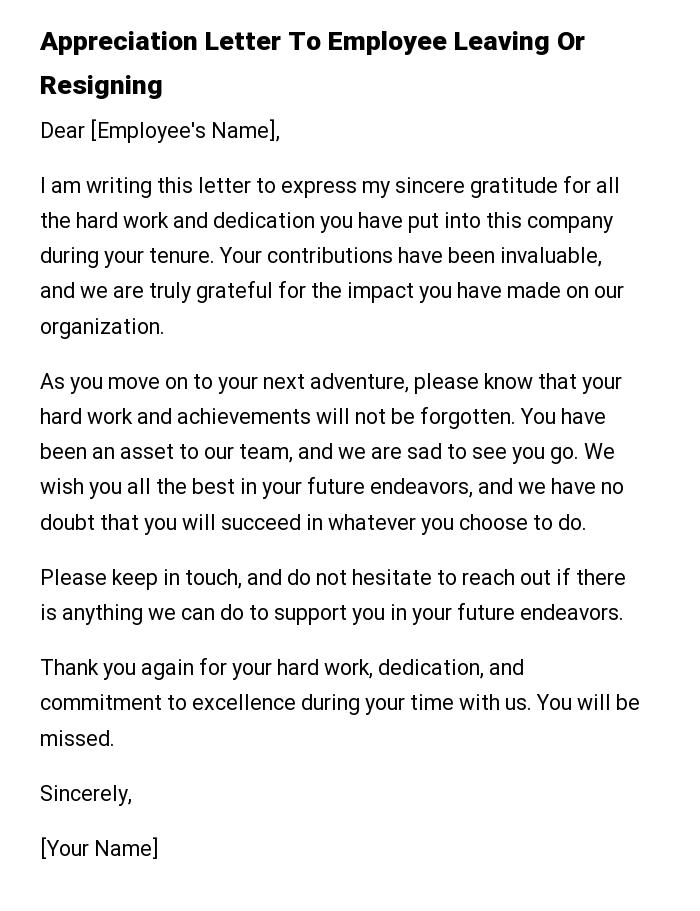
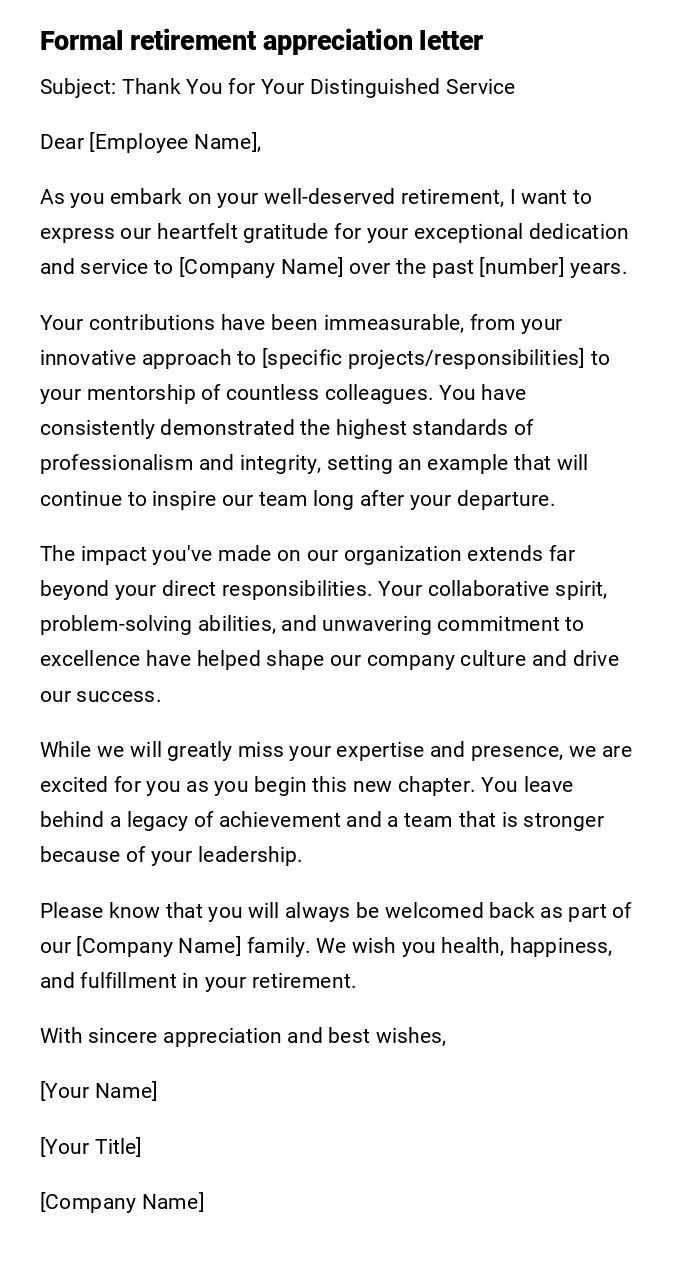
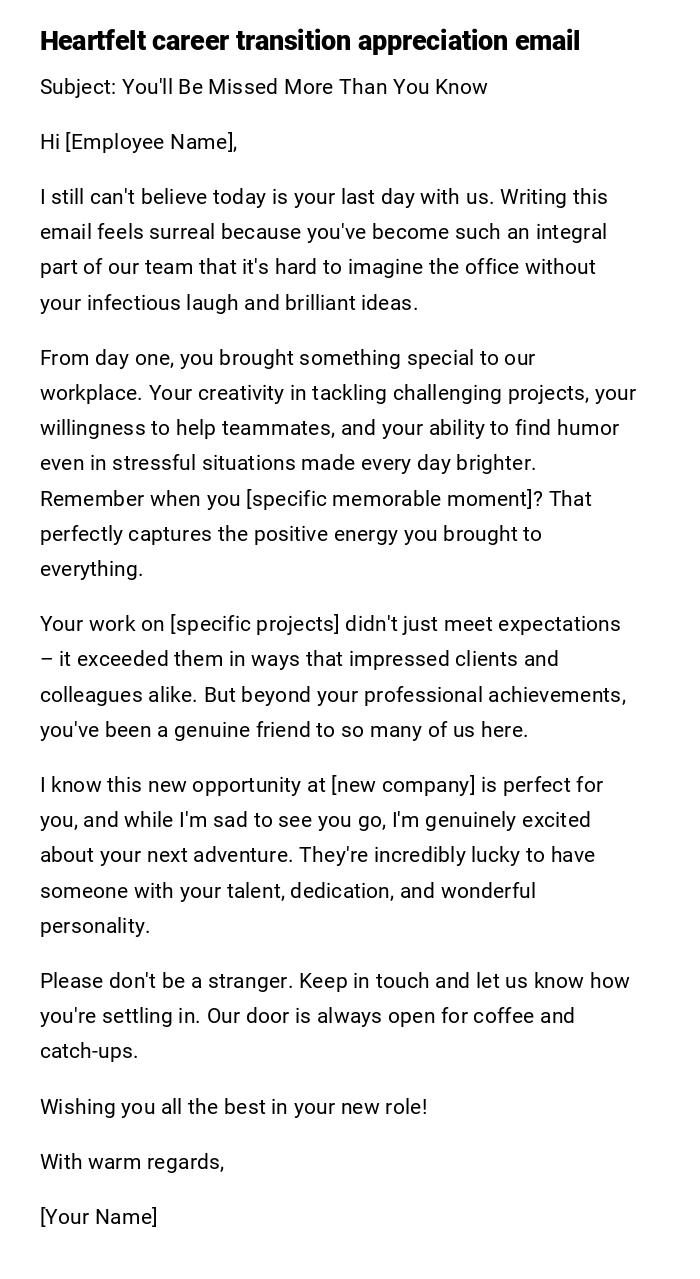
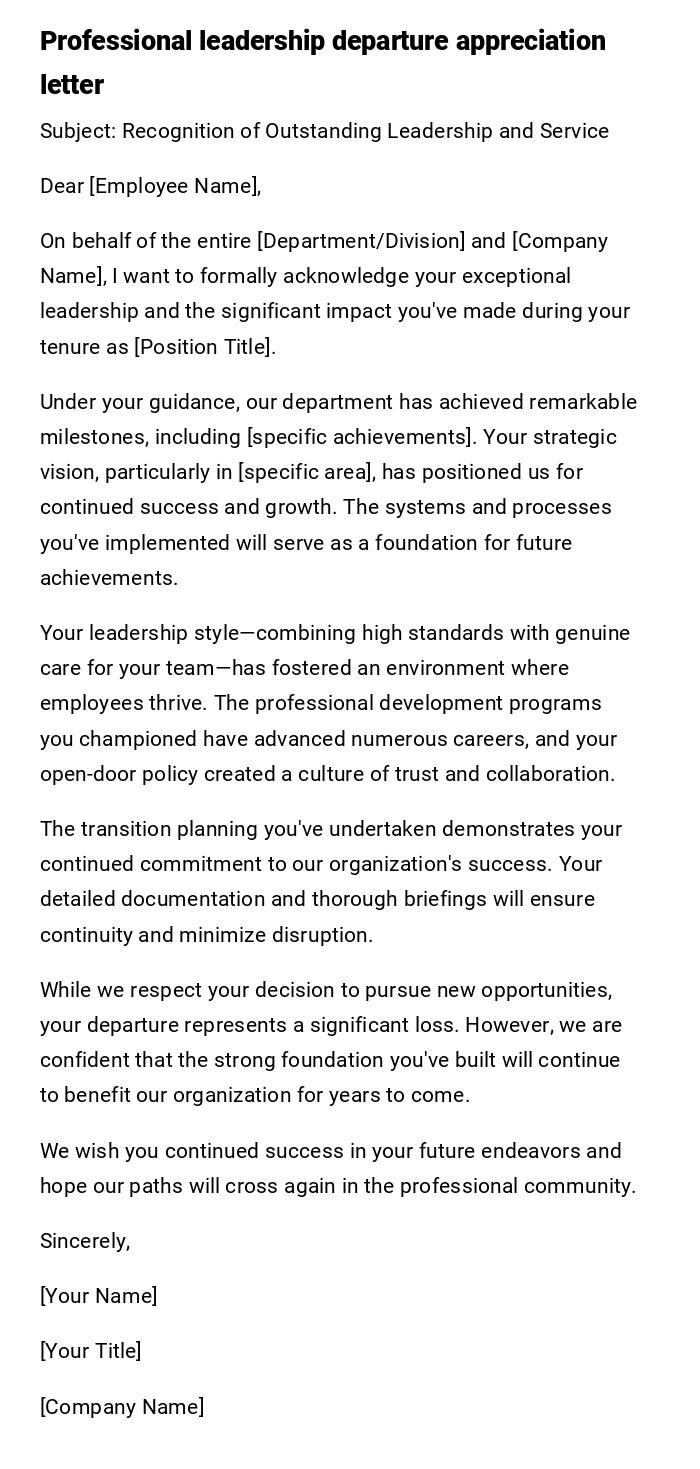
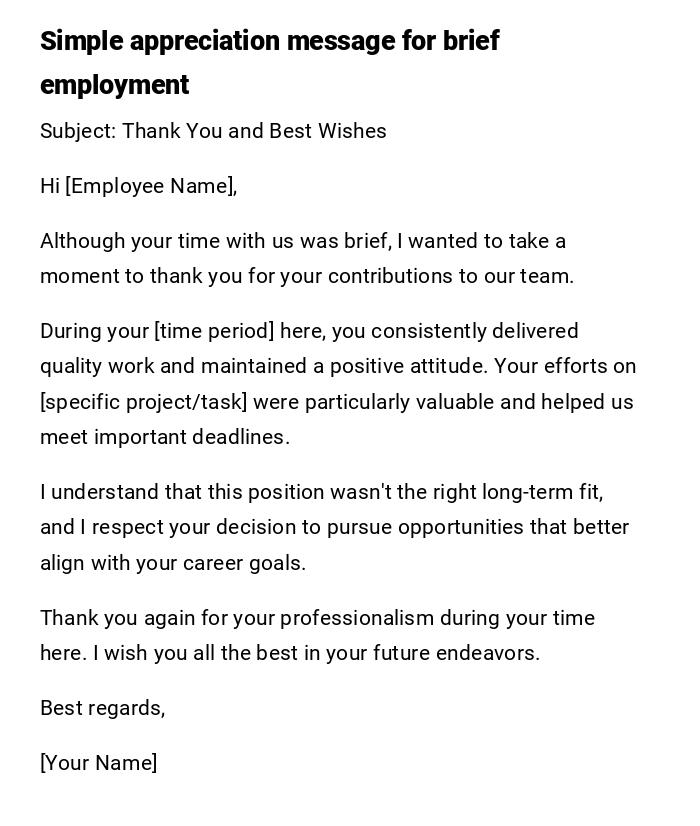
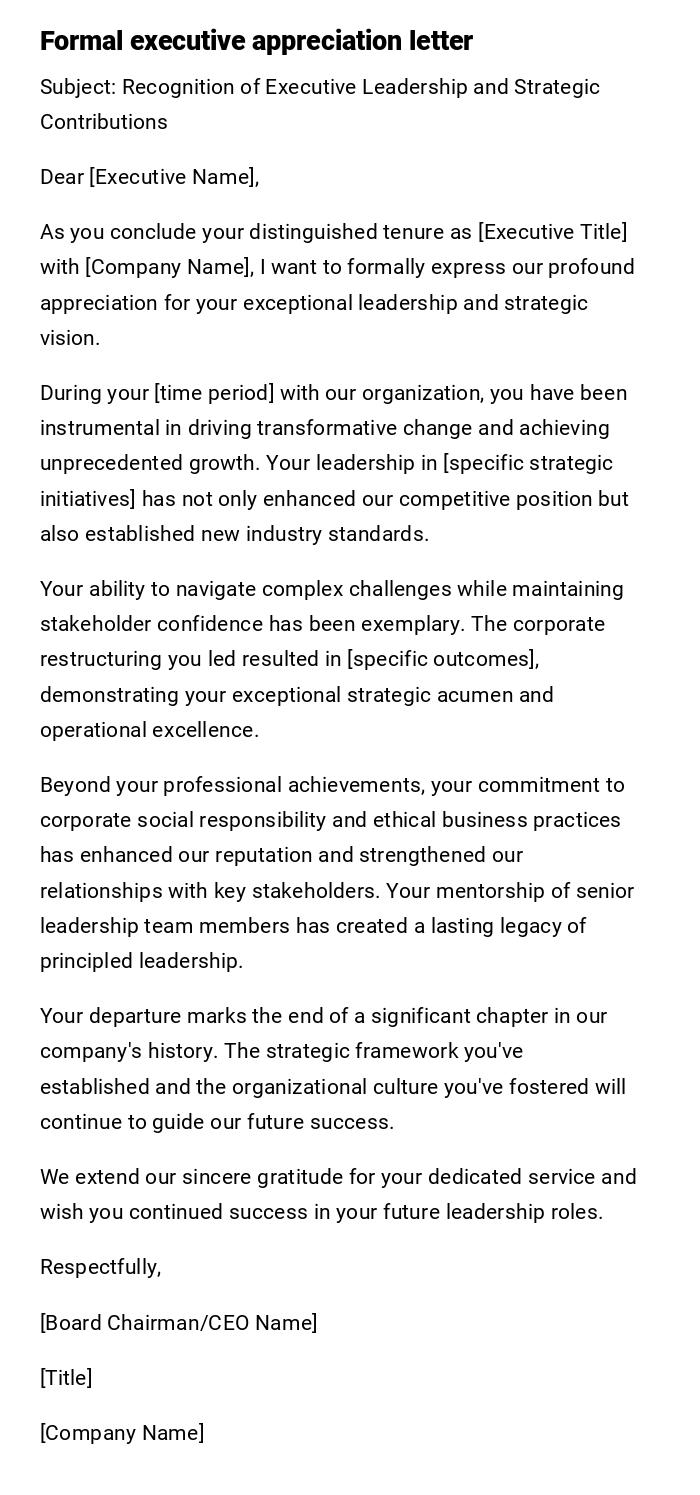
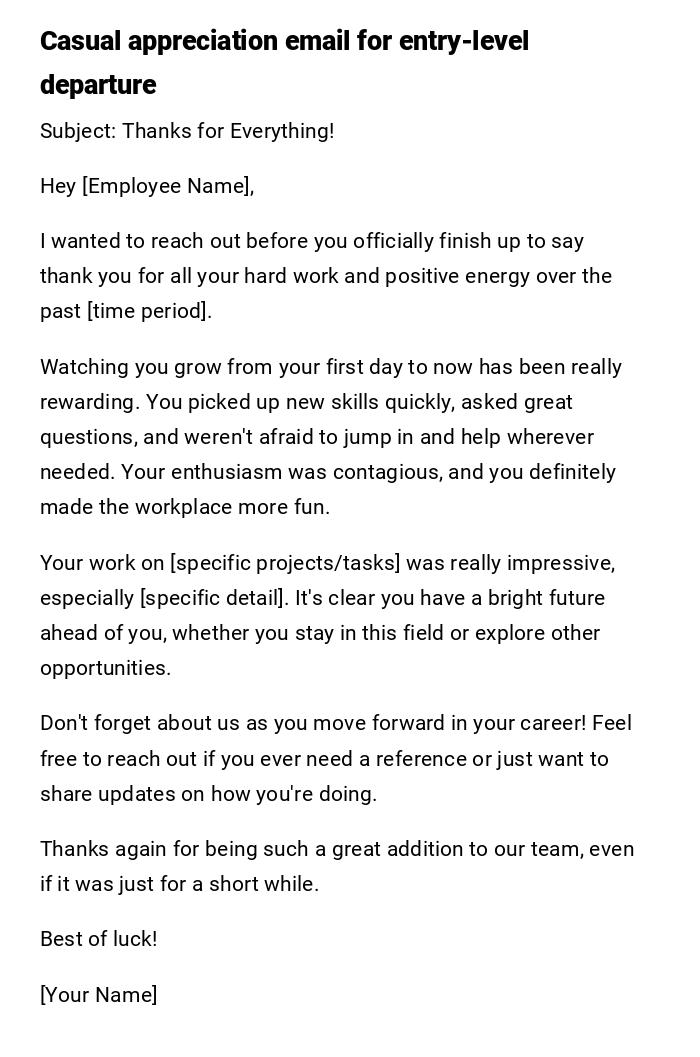
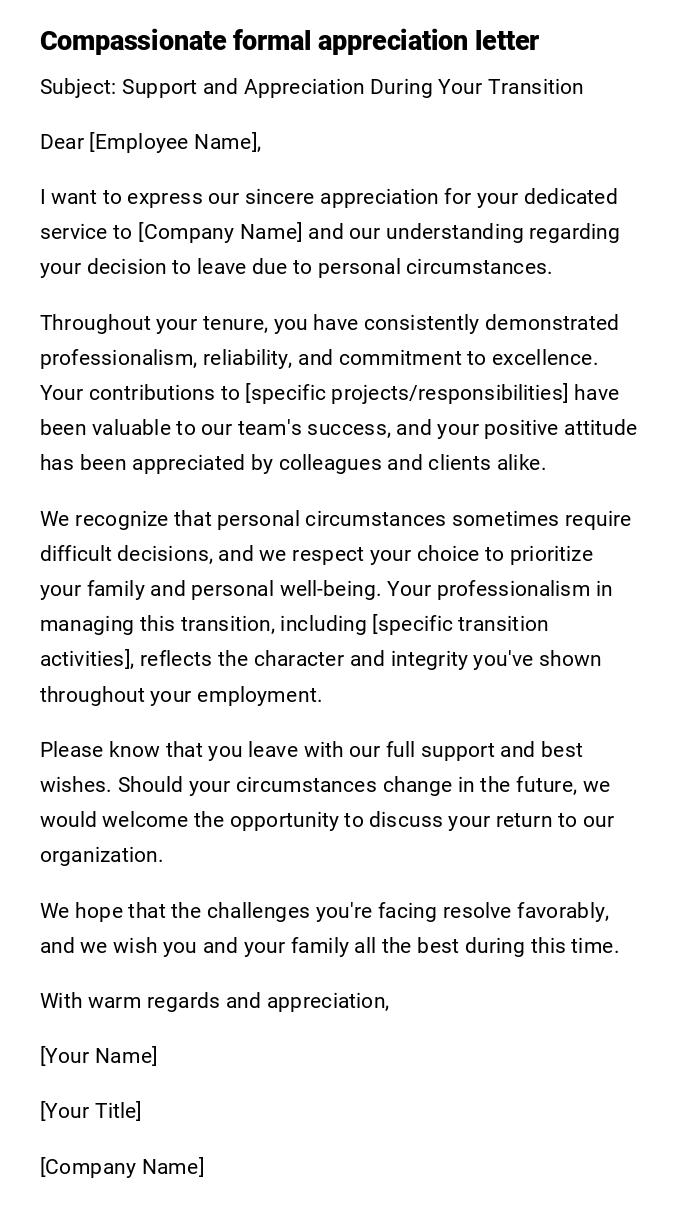

 Download Word Doc
Download Word Doc
 Download PDF
Download PDF